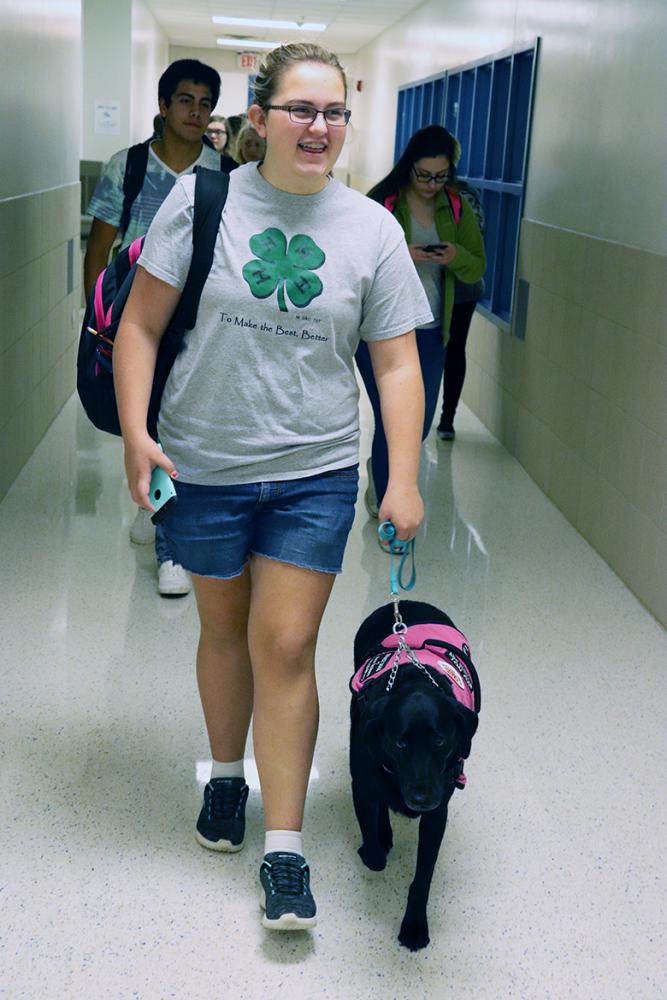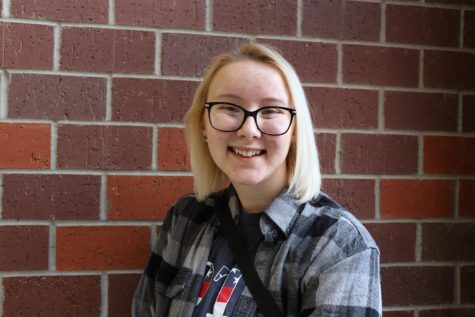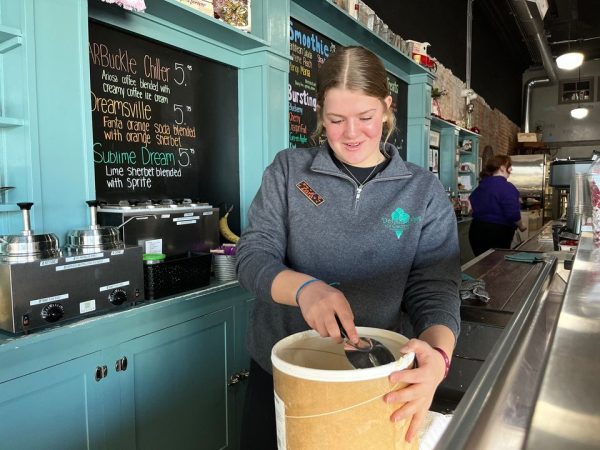Dog on duty at NPHS
Service dog Shadow helps monitor blood sugar levels for for freshman with Type I Diabetes
Service dog Shadow walks with freshman Kaitlyn Connelly ready to alert her about her blood sugar levels. “I’m starting to get more comfortable with the school. That has really what made me nervous, because I didn’t know how people were going to react and I didn’t want to be swarmed in the hallway.”
“At home, she’s a normal dog. She’s a completely different dog when she gets her vest on,” said freshman Kaitlyn Connelly about her service dog, Shadow. Connelly was diagnosed with Type I Diabetes when she was 7-years-old, and her family purchased Shadow about three and a half years ago from a company called Service Dogs by Warren Retrievers. Shadow cost around $25,000, but according to Connelly, she was worth it. “The best part [about having her] is probably feeling a bit more secure,” said Connelly. “I just enjoy not having to worry too much.”
Type I Diabetes is an autoimmune disease that affects the pancreas, causing it to produce little to no insulin. “I didn’t do anything to cause it,” said Connelly. When she was first diagnosed, she spent about a week in the hospital. Throughout that week, Connelly said she spent a lot of time with the nurses while her parents were being taught how to care for her. “When it was [time] to go, I just went home and worked with it,” she said.
Although there are treatments to help with Type I, there is no cure. “I’ll have it for the rest of my life,” she said. After first being diagnosed in elementary school, Connelly remembers when other students would write her cards and bring her treats. “People would bring me cupcakes without frosting on them, which made me feel kind of bad,” she said. “I can eat everything that everybody else can, I just have to take insulin for it.”
Connelly finds herself having to check her blood sugar a lot, usually about 10 times a day. Shadow helps with that though. “When she’s here, I only check it about six, which isn’t nearly as bad,” she said. Shadow is capable of “sniffing out” when Connelly’s blood sugar is too low or too high. Shadow paws at her leg when there’s an issue with her blood sugar, and she typically notices about an hour before any major level drops. “When it goes high, it’s a really sugary-sweet smell for her. When it goes low, it’s really stale,” she said. Shadow is a huge help to Connelly, but it took a lot of training to get her to where she is today.
When Connelly first got her service dog, things were a little rocky. “They [Service Dogs by Warren Retrievers] flew her out here and they stayed with me for four days to train her,” said Connelly. “After four days, I was kind of on my own and it wasn’t going very good.” After three months, they sent another trainer, “It was a lot better after that,” she said.
Now, Shadow comes to school with Connelly full time. “[Shadow] started going to school with me in sixth grade, towards the end of the year, just to kind of get her used to everything,” said Connelly. “She was terrified to go in [on] the first day.” As time went on, Shadow got more comfortable being in the school and around a lot of students, but Connelly is a little anxious about being around a new body of students this year. “I’m still a little bit nervous about how it’s going to go,” she said. “I didn’t know what people were going to think about me.” On the first day Connelly brought Shadow though, she said there weren’t “a lot of looks.”
Even though Connelly and Shadow are mostly comfortable at North Platte High, it’s important for students and teachers to realize that Shadow is not just a pet, but a service dog who has a job to do. “I don’t want people in the hall to be like, ‘Come here puppy puppy!’ I’ve had people call her in the halls [before], and that’s not something they should do,” said Connelly. “She knows by now to ignore them, but that doesn’t stop them from trying to [get her attention].¨

Haley McKain 2018
Co-Editor in Chief
A little bit about me
I cry all the time. Not always in a bad way or anything, but when I’m mad, sad, and especially...




